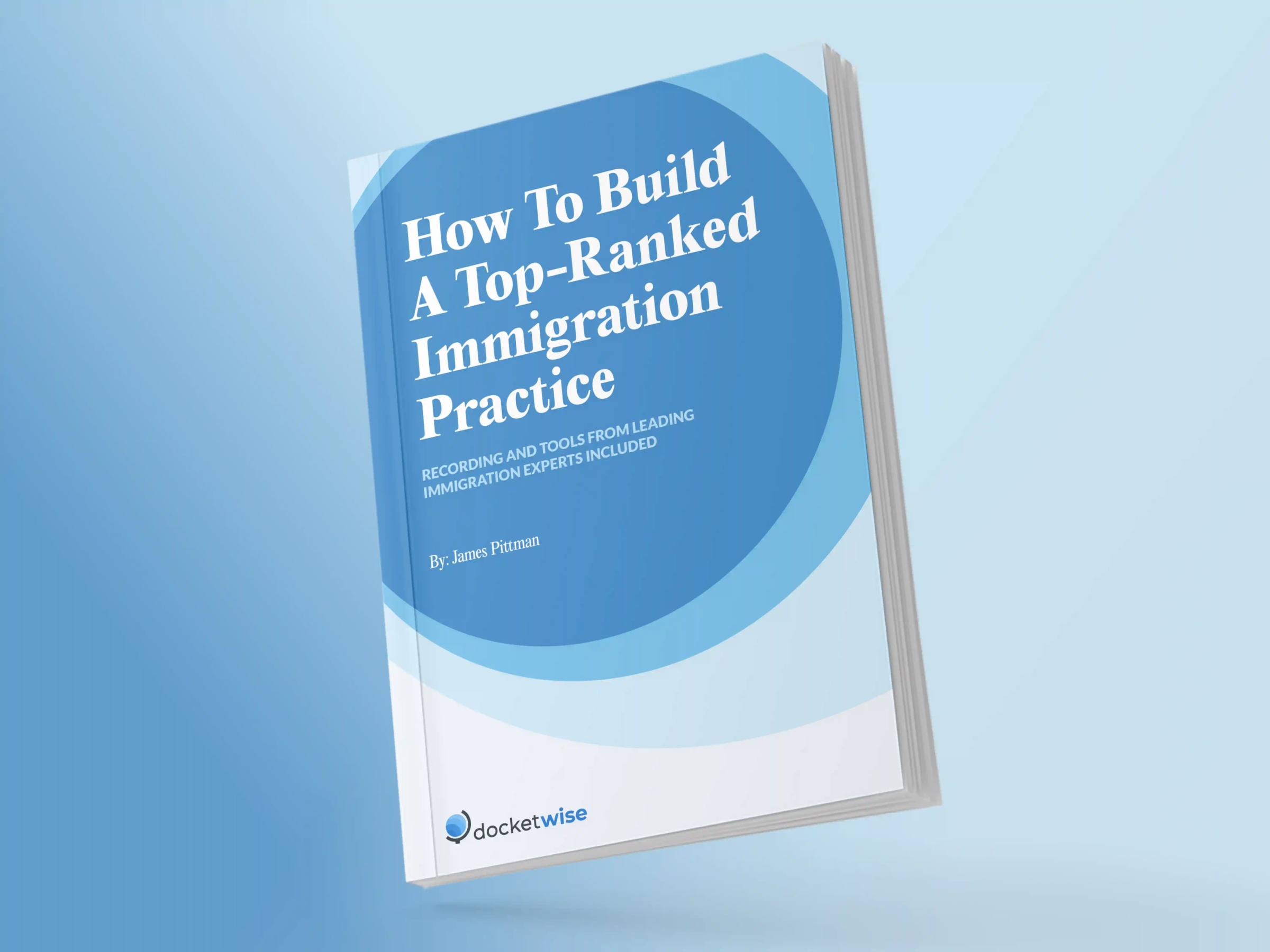Immigration law firms have unique challenges when it comes to managing their affairs. But answering how to manage a small law firm is more complex than many licensed attorneys would like.
From dealing with immigration policy changes to managing clients’ expectations, there is a lot that small immigration law firms need to consider in their day-to-day operations. By definition, a small law firm can range from just one attorney to a maximum of ten, so resources and time are often limited.
Of course, here lies another challenge. Small law firms face formidable challenges when competing with larger firms with more resources and staffing.
However, there are ways in which small law firms can leverage their strengths and differentiate themselves to stand out in the market. One of the most effective strategies is cultivating client relationships while delivering top-quality legal service.
Managing an immigration law firm and helping your clients receive their green cards is no easy feat. But with the proper guidance, you can avoid costly mistakes and ensure that you operate correctly.

Managing a Small Law Firm Versus Large Law Firms: Differences and Challenges
Small law firms face unique challenges compared to their larger counterparts. They have fewer resources, including limited budgets and fewer employees, and need the established reputation that larger firms enjoy.
However, managing a small law firm has advantages, such as agility in a dynamic market, offering competitive rates, and developing more significant personal connections with their clients.
When it comes to immigration law in particular, small firms might find themselves in a tough spot, trying to stay on top of a comprehensive legal US ecosystem. Apart from staying up-to-date with constantly changing immigration policies and regulations, they must also develop an understanding of the different cultures and languages that their clients bring.
Common Mistakes When Managing a Small Law Firm
We mentioned that keeping up with the latest immigration policy changes can be pretty arduous. But to provide the best legal representation, legal professionals must scrutinize each policy.
That being said, clients and legal practitioners can stay informed about changes in immigration laws by regularly reviewing the websites of the primary regulatory agencies that govern immigration. These agencies include the United States Citizenship and Immigration Services (USCIS), the Department of State (DOS), and the Department of Labor (DOL).
The USCIS manages lawful immigration to the United States, including the processes for immigration visas, naturalization, and other related issues. The DOS oversees immigrant visa processing and maintains the Consular Electronic Application Center (CEAC), which allows individuals to check the status of applications. Meanwhile, the DOL administers and enforces laws related to employer-provided visas and monitors workplace conditions for foreign employees.
Other government agencies can play a role in immigration law. The Department of Justice (DOJ) oversees the Executive Office for Immigration Review (EOIR), responsible for conducting immigration court proceedings. The Department of Homeland Security (DHS) manages border security and anti-terrorism efforts, and its agencies (including Customs and Border Protection and Immigration and Customs Enforcement) enforce immigration laws.
With that out of the way, let’s explore the other significant challenges small immigration firms might face and share essential tips on managing your firm effectively.

Lack of Strategic Planning
One of the universal challenges affecting all law firms, regardless of whether they specialize in immigration or personal injury defense, is the lack of strategic planning. Law firms must develop a clear and concise mission statement and set specific goals and objectives to achieve it.
However, many firms need to establish a comprehensive strategic plan, which can lead to a lack of focus and direction. With a clear roadmap, law firms may take advantage of opportunities to improve their services and expand their client base.
And once they outline their goals, only then can they pinpoint just what kind of solutions they require to optimize their workflow, such as case management software to help them better manage an increasing number of clients.
When planning a comprehensive strategy, ensure that the following points are on the board in your law firm:
Differentiation. Identify the firm's unique selling proposition that differentiates it from its competitors. This could include specialized knowledge, past successes, or a unique approach to client service_._
Service Offerings. Consider adding services that are in high demand. Assess the firm's current service offerings and identify areas for improvement or expansion.
Marketing and Branding. Develop a comprehensive marketing and branding strategy to increase visibility and establish the firm's reputation as an expert in resolving immigration challenges. This may include creating a solid online presence, attending relevant conferences and events, and building strategic partnerships with other businesses and organizations.
Technology. Invest in and utilize technology to streamline internal processes and improve client service. This may include adopting case management software or using social media for communication with clients.
Team Development. Identify opportunities for team training and development to ensure that the firm's attorneys and legal professionals remain up-to-date on changes to immigration laws and procedures. This may involve attending relevant training courses, seminars, and conferences.
Poor Time Management
Taking on too many immigration cases might back every small law firm into a corner, lead to crunching working hours, and impede the quality of your legal representation process. Many small firm attorneys' daily activities only pertain to practicing law.
It is, therefore, essential to explore solutions that can enhance productivity, just as if you had expert hands providing sterling legal assistance for immigrants seeking to migrate to the United States legally.
One of the best things any small law firm can do is find the best immigration case management software and leverage it to streamline internal processes and improve their service delivery. With the aid of case management software, small law firms can easily manage clients' case files, schedule appointments, and automate routine administrative tasks, saving them considerable time and effort.
Failure to Leverage Technology
There’s not a field across all industries that have not benefited from technology in one way or another. And as things stand, almost all successful law firms leverage technology to a certain extent to streamline workflows.
Immigration law firms with the right software solution can collect, manage, and store clients' data without a hitch. Plus, the case initiation process is as simple as it can be with multilanguage smart form compatibility. Docketwise supports Spanish, French, Portuguese, Arabic, Russian, Hindi, Chinese, and other languages.
In addition to that, Docketwise’s Amazon S3 (AWS Cloud Storage) ensures that all your data is safe as it houses state-of-the-art security precautions such as:
ACL (Access Control List)
Default encryption
Enforced encryption of data in transit
Permission checks
Multi-factor authentication (MFA)
SOC 1, 2, and 3 Certification
Ignoring Financial Management
A law firm must implement proper financial procedures or hire an accountant to avoid late tax payments, cash flow problems, and inaccurate financial records.
These problems can negatively affect the law firm and its clients. For example, inaccurate financial records or cash flow problems can lead to malpractice claims or ethical violations.
Docketwise can help you track time as you work and create time entries. You can then implement those time entries into your invoices so that clients know exactly how much you charge for your legal practice services.

How to Manage a Small Law Firm Better
As a law firm owner, knowing how to manage a small law firm effectively can make all the difference in the world. You must constantly adapt to and overcome the various law firm challenges you and your team of attorneys face. The biggest favor you can do for your entire firm is to harness the power of evolving technology to set you up for long-term success and ensure your law firm stays competitive in today’s fast-paced business climate.
All in all, using immigration case management software will help you embark on a path toward running a law practice that’s streamlined, digitalized, and effective. So don’t wait; explore the features of Docketwise and see how it can benefit your immigration law firm.
Unlock Your Success as an Immigration Lawyer.
Download Now
About the author

Justin FisherContent Writer
Justin Fisher is a content writer and SEO strategist for leading legal software companies, including MyCase, Docketwise, and CASEpeer. He specializes in writing about emerging legal technology, financial wellness for law firms, and more.